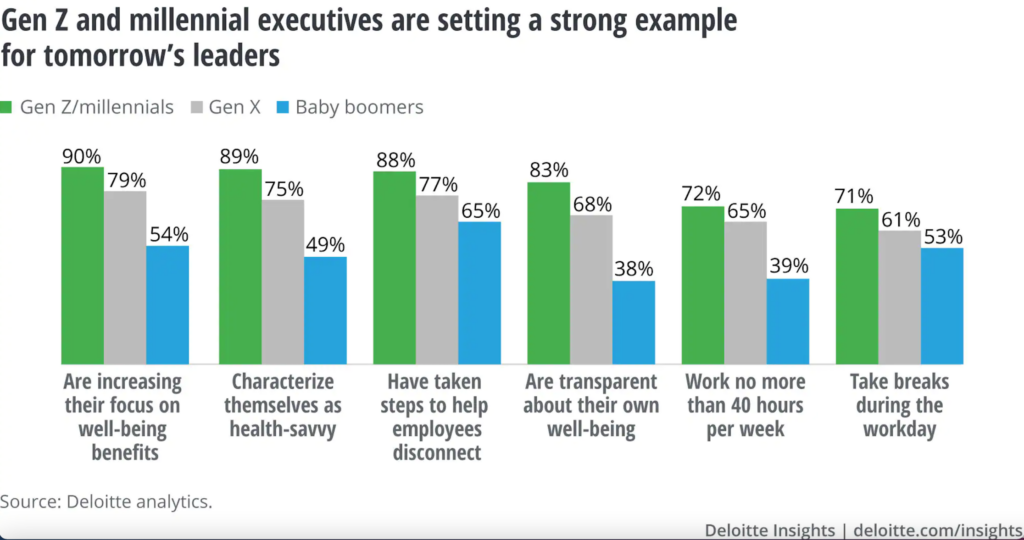Why ‘boomer’ bosses need to let go of the past
“We were miserable coming up, so they should be miserable too!”
All too often that is the defence of incumbent C-suites, those who cling on to outdated command and control management ideals, those for whom hierarchy outweighs talent or passion, particularly when talking about younger workers.
For these bosses, words like ‘mental health’ and ‘wellbeing’ will invoke eye-rolling, countered with the Victorian mill mindset that workers should constantly fear for their jobs, and that anxiety is a genuine foundation for growth.
But, as new research from Deloitte shows, that is, for want of a better word, absolute garbage and C-suites really need to wake up from their insecurity-induced coma and genuinely see the disruption abroad in the world of work.
‘The C-suite’s role in wellbeing’ is the latest research written by Steve Hatfield, Deloitte’s Global Future of Work Leader, the US Chief Well-being Officer Jen Fisher and Paul H. Silverglate who leads the US Executive Accelerators. It throws a spotlight on just how far apart bosses are from their employees, and the existential challenge this could generate for companies and organisations.
And, it also highlights the opportunity that exists for the C-suite that can embrace the new reality and the threat of continuing to ignore it.
Skipping right to the end of the report, the section Younger leaders are paving the way, paints a fascinating picture.
Quoting the report, the authors write: “While all C-level decision-makers need to reexamine their approach to workforce well-being, our survey revealed that in many areas Gen Z and millennial executives are leading the charge. They were significantly more likely than their older counterparts to report that they’re prioritizing wellbeing and work-life balance for themselves and their people, and they were also more likely to say that they’re transparent with their workforce.
“Leaders who belong to Gen X or Baby Boomer generations should take note of these differences and reflect on whether they could be doing more. It’s clear that some aren’t setting the right example for their workforce, they’re not focused on their own well-being, and they may not be taking the necessary steps to attract and retain talent.”
Indeed, just take a look at the graphic from the report.

So ‘Boomers’, as my son often refers to me, are unsurprisingly the worst offenders, often thinking they are setting the tone by not admitting issues either to themselves or their workforces, believing instead they are ‘leading from the front’ by taking fewer breaks, working longer hours, and ignoring the possible benefits of wellbeing.
Back to that command and control mentality, that inability to show weakness which in my view is a greater weakness, both in terms of leadership and personal health. And Deloitte’s research would seem to back me up, at least in part, with evidence that it is indeed ‘tough at the top’.
“…a substantial proportion of both groups reported experiencing fatigue and a variety of mental health issues, with C-suite executives identifying most of these issues just as frequently (or in some cases more often) as employees—proving that well-being, or the lack of it, does not discriminate by rank,” said the report.

More overwhelmed, lonelier, and more depressed? And just about as stressed and exhausted as the people who work for them, how is this a sustainable model for leadership, how is this a foundation for success?
The fact is, it isn’t. Like ESG and digital transformation, mental health and wellbeing are no longer nice to haves, they are imperatives for any future success.
In conclusion, the report stated: “The time for action is now since the requirements around this will only continue to grow as empowered workers demand more from their employers. In fact, the long-term success of many organisations may depend on whether they can rise to the challenge of addressing workforce well-being, given that 57 percent of employees said they may soon quit for a more supportive job.
“The journey to health-savvy leadership certainly won’t be easy. However, it’s not just workers that will benefit—executives also stand to gain a lot by embracing this new reality. Not only can they become better and more purpose-driven leaders, but they may discover that they’re finally able to prioritize their own well-being.
“It’s a critical shift that could help them stay the course in their role and become steadfast ambassadors of a better tomorrow.”
